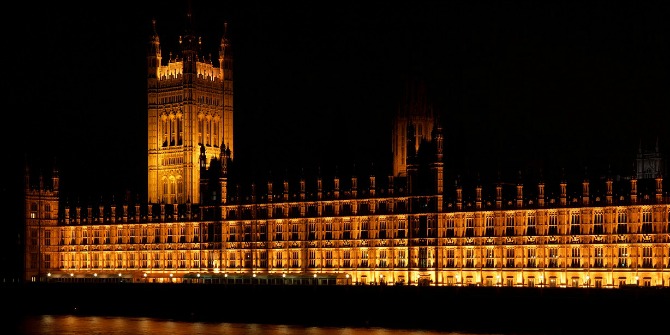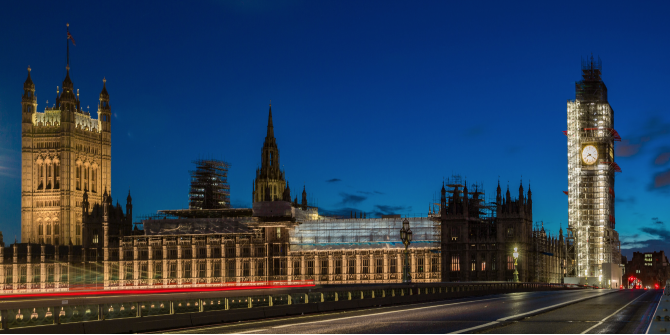
 Michael Kenny and Tom Kelsey discuss the possible constitutional impact of the recent standoff between Andy Burnham and Boris Johnson. They explain why it will take a crisis of much greater proportion and longevity to pave the way for meaningful devolution within England.
Michael Kenny and Tom Kelsey discuss the possible constitutional impact of the recent standoff between Andy Burnham and Boris Johnson. They explain why it will take a crisis of much greater proportion and longevity to pave the way for meaningful devolution within England.
The public row between central government and the leaders of Greater Manchester over the imposition of Tier 3 restrictions, which erupted in the middle of October, was a big blow to the Johnson government’s attempt to evolve its regional lockdown strategy. It may also have contributed to the realisation that such an approach was increasingly hard to defend in political terms.
It also did more to boost public awareness of England’s ‘metro mayors’ among a largely indifferent public than any other single event since they were created. The row provided a boost to the profile and political importance of Andy Burnham in particular, now labelled, in some excitable commentary, ‘King of the North’. The spectacle of this former New Labour Minister and erstwhile political insider taking to the steps of Bridgewater Hall to berate the Prime Minister for ‘playing poker with peoples’ lives’ was striking. It certainly transfixed media outlets in London which had hitherto paid hardly any attention to him and his fellow mayors.
Whether this crisis will lead to reforms designed to create a more decentralised administrative model in the largest part of the UK is far less certain than much of the commentary it has elicited tends to assume. In part, this is because this episode also reveals the extent to which the centre holds pretty much all the cards when it is dealing with other layers of government. The leaders of Greater Manchester were unable to extract an additional £5million of financial support from Westminster which had already reached deals with the Liverpool City Region and Lancashire which it did not want to exceed. And, to put this issue in context, the sums involved in these negotiations were only a fraction of the investment associated with the decision to extend the furlough scheme until March 2021.
Even before this row broke out, the UK government’s insistence on declaring, rather than co-designing, the terms of Tier 3 restrictions in Greater Manchester had become a telling sign of the centralising reflex which COVID-19 has triggered in British government. This is in striking contrast to the response of a number of other countries, such as Germany, where key parts of the response to the pandemic – for instance, the administration of systems of testing and tracing – have been led at lower administrative levels, and where cooperation across different levels of government is more familiar.
In the UK, by contrast, strains and tensions arising from its increasingly unbalanced model of devolution, the centralised cast of public administration in England, and the ingrained unwillingness of the British state to see itself as part of a wider network of responsible governing bodies, have all been thrown into stark relief by the pandemic. Johnson’s spat with the mayors has drawn particular attention to the intermediate tier of government which has emerged out of a series of separate, bilateral negotiations between Whitehall and different groupings of local authorities over the last decade, and which covers just over half of England’s geographical area. These new bodies have acquired a limited set of administrative responsibilities in areas relating to economic development, typically in areas like skills, transport and planning, although Manchester has additional powers to the other authorities. But they all lack meaningful control over their own revenue streams and are not empowered to determine their own priorities when these diverge from the preferences of the centre. The term devolution is in some ways a misleading description of this model; delegation would perhaps be more accurate.
Yet, despite the pronounced asymmetry of power between the administrations led by Johnson and Burnham, the latter was able to cause considerable discomfort for the Prime Minister, and succeeded in placing the question of central-local relations in England – for a while anyway – onto the political agenda. He did this both by taking the negotiations into the public arena and by working in tandem with a diverse political coalition of council leaders, local business grandees, and some influential Conservative MPs (including 1922 Committee chairman, Graham Brady). What made this such a difficult moment for Johnson was the support for Burnham’s demands from several senior figures in the Prime Minister’s own party.
More generally, Burnham’s willingness to escalate a dispute about financial support for businesses and individuals affected by lockdown restrictions turned this into a conflict that touched on a profoundly sensitive issue – the belief in many parts of the country that policies and investment decisions tend to favour London and the South East, and are far less sensitive to the needs and interests of other places. This intervention dramatised a feeling of neglect and disenchantment that has been building over a much longer period. This mood helped fuel the vote to leave the EU in 2016 and it has been ignited again by the regionally differentiated model of lockdown introduced in the face of the second wave of COVID-19 – an approach which raised difficult questions for the centre about the basis for, legitimacy of, and evidence informing its decision-making.
Support for Burnham’s stance in Greater Manchester was reasonably strong, with 56 percent of local people approving of his handling of the COVID-19 crisis, compared to the 20 percent who disapproved. Only 23 percent of people approved of the Prime Minister’s approach, on the other hand, with 61 percent disapproving. The government felt compelled to negotiate with Burnham, primarily because of the mandate he claims as a directly elected representative of the people of his area – a development that should perhaps give those sceptical of the idea of directly elected mayors – including many avowed ‘localists’ – pause for thought.
The dispute also resonated because it touched upon the increasingly fraught problem of English consent for the model of asymmetrical devolution which has resulted in legislative devolution to all other parts of the UK, but not to England.
Politicians at the centre have tended to agree that England needs its own system of decentralised administration, but have mainly thought about this as a tool to tackle growing regional inequality rather than engage the issues of popular control and consent which were so prominent in the minds of the architects of devolution to territories outside England. It may be that one of the lessons that will be drawn in the popular mind from the standoff between Burnham and Johnson is that devolved government here is, in constitutional and practical terms, pretty puny in comparison with that established in Northern Ireland, Scotland and Wales. The latter all have the policy tools and authority to manage their own public health responses to the pandemic – although the current UK government’s centralising reflex is also leading to increasingly fraught dealings with them as well, not least in the context of its contentious Internal Market bill.
However, when it comes to the idea of devolving power within England, politicians have disagreed fundamentally about how such a system should work, and at what geographical scale it should be built. Labour figures have, for the most part, stuck to an ingrained commitment to the idea of devolution to large regions, although such units appear to elicit very little popular support. And the Conservatives have tended to favour governance at the level of cities and counties, but have also been more alive to the growing perception that the interests and identity of England as a whole are not adequately represented by the system of territorial governance that has developed in the UK.
Whether this recent conflict will change any of these entrenched political assumptions and narratives, and whether it will loosen the hold of the partisan shackles upon more imaginative institutional thinking in this context, seems unlikely. Labour has started to talk the language of decentralisation, but this has become a habit of opposition parties in British politics, which is all too easily shed once power is won.
Equally, the UK government has signalled its intention to extend the existing model of devolved administration. But it has tethered this ambition to two very different goals, each challenging enough in its own right – the delivery of its still elusive ‘levelling up’ agenda, on the one hand, and the reorganisation of local government, on the other. It has been widely reported that it was planning to create a suite of new large unitary authorities, while potentially abolishing some district councils. These ideas have triggered considerable opposition, particularly from within the government’s own party, resulting in a further delay to the much anticipated ‘Devolution and Recovery’ White Paper.
Such is the ingrained pattern of centralism in England, and so limited is the political discourse about what devolution could and should mean in this setting, that it may well take a crisis of much greater proportion and longevity than that triggered by the mayors’ revolt of October 2020, to pave the way for meaningful and long-lasting reform.
_____________________
 Michael Kenny is Director of the Bennett Institute for Public Policy at Cambridge.
Michael Kenny is Director of the Bennett Institute for Public Policy at Cambridge.
 Tom Kelsey is Researcher at the Bennett Institute.
Tom Kelsey is Researcher at the Bennett Institute.
Featured image credit: The BMA on Flickr (CC BY-NC 2.0).








1 Comments